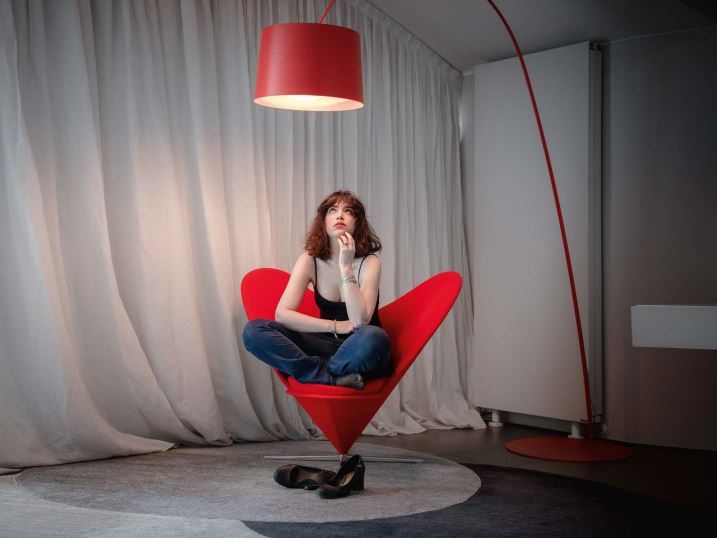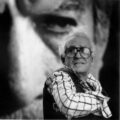March is a special month for the AbanoRitz, choosen not by chance by Terry and Ida Poletto to be dedicated to a dream, a project, a reality: the realization of the Super 8, that we invite you to discover, week by week. Eight authors stayed in our hotel, but more precisely in our rooms at the fifth floor: our Creative Rooms. Eight rooms, eight writers, eight telling.
This week we read Ilaria Gaspari, class 86, born in Milan and she live today between Paris and Roma. She studied phylosophy at the Normale of Pisa to get her università degree at the Sorbonne with a thesis about passions. Different publications and various collaborations with newspapers. Passions, emotions and so love, this is why she arrived in the room 515 that she presents us with
“A whole heart”
Isa used to climb up onto the top of a barstool to do her homework. On the other side of the bar, Ivo would make cocktails and ask her the eight times table. When they got to eight times seven, Isa, sitting with her legs dangling, would say: fifty-six, but before nodding like he always did, Ivo would hesitate. Isa knew it was just because that was how old he was. She was eight years old, he was seven times that. The silver trays shone with ruby reflections. Ivo used to cut blood oranges into slices and then give her a stem glass of fresh-squeezed juice, treating her like a real lady. “Here is your Spritz, madam” he used to say. “Would you care for some puff pastry canapés?” She was very fond of them, and she was also fond of olives. However, olives would only come around towards the end of the spring, when the days were long and wearying and the sun seeped from the wide-open windows onto the carpets, the brassware, the lustrous wood of the piano and the great chandelier entirely made of upside-down handkerchiefs (not fabric handkerchiefs but handkerchiefs made of Murano glass). In the summer, elegant women went down the streets, wearing long low-necked dresses, stoles, satin turbans, fans and oval tablets earrings. Isa’s schoolmates lived in houses which all looked similar. Isa’s house, though, was not similar to any other one. It had miles of dark turquoise carpeted corridors and twenty-seven armchairs just in the foyer. Lunches and dinners were prepared by five cooks in a steaming and bubbling kitchen of deep wide pots. Isa could choose from amongst the seven dishes on the goldenframed menu, and when she was sad, she would hide in the pantry. In the kitchen, they used to listen to the voice of that female singer on the radio who Isa liked so much, the one who sang as if she was smiling, but, strangely enough, she would infuse her smile with great sadness. At least that is what it felt like to Isa, whereas her mum claimed that it was just because of the singer’s accent. “Perhaps”, Isa thought. However, she harboured the secret belief that that voice truly sang while smiling and smiled with sadness. One fine day, Isa had the opportunity to discover how things really were. The owner of that voice appeared at the reception, behind an enormous pair of dark glasses. Isa and her mum recognised her immediately, thanks to the elaborate mass of dark hair which towered above her head, adding a dozen of extra inches to her already imposing height. On the luggage trolley were four monogrammed suitcases. Backlit, by the entrance, a taxi driver was peering at the watermark of the banknote he had been handed over by a ringed hand as a tip. She definitely was not the first famous guest at the hotel. When on the phone her secretary had said that Madame made a habit of travelling in the most rigorous anonymity, Isa’s mum could easily respond that there was definitely no need to specify that. Utmost discretion, ça va sans dire. On the hotel register, the reservation had been written in large letters by fountain-pen under the name of Madame Dubois. Nevertheless, her trunks boded a rather flamboyant anonymity, but Isa knew that that was the way famous people travelled, under names as false as the gold of Japan and with enough luggage to clothe an entire army. “Things are a bit different in this case, little miss” Ivo explained to Isa while she was finishing the summary of The Baron in the Trees and he was making some punch. Although her voice came out of the radio constantly, the singer had promised herself she would never go back to Italy again, after that dreadful night of many years before when she sang on a stage full of flowers without knowing that, not far from there, the love of her life was dying. Ivo was not afraid of upsetting the girl with stories which adults would barely whisper when in front of her. Isa was grateful for that. Besides, he was the only one who called her “little miss” and she was grateful for that too. It was such a sad story. “So, what is she doing here, then?” Isa asked at that point. “We’re not in Italy?”. Her doubt was legitimate, but Ivo explained that after doctors had suggested curing with mature mud baths certain rheumatisms which were making it difficult for her to tread the boards, she chose the hotel without hesitation. Everyone knew that, for that kind of treatment, nobody in the world could measure up to the hotel. Madame knew that, if she did not recover, she would have to give up singing, and that would have been like losing her love for the second time. Isa began observing the woman every time she could. She had quite a lot of spare time as there was no school and she had already finished her summer holiday homework. The singer was getting up late in the morning, or better yet, she was getting up early but would come down late as she would have breakfast in her room. Isa had been following the white bow of Marisa’s apron up to the door of room 515. Glittering on the silver tray there would be a domed cover over croissants, a coffee jug, a stem glass with fresh-squeezed juice and a dahlia in a small vase. Marisa would knock three times and then, as prescribed, recede. After her footsteps faded away to the end of the corridor, Isa would count to ten from her hiding place amongst the curtains. Then, she would hear a click and two long dusky hands would seize the tray from the ends, after which the tray and her hands would disappear, then another click and Isa would go down to the foyer. Isa would study the woman while she was sitting having lunch, alone, behind the Japanese-patterned folding screen. Towards the evening, she would see her reading, in the park, underneath a big straw hat. Madame never spoke or smiled and Isa felt sad for that. Sometimes children understand things better than everybody else, because they do not pay much attention to what the causes and effects are. Isa did understand one thing. Until the point when Madame smiled again, her voice would be lost, and that, like Ivo had explained, would break her heart for the second time. So, Isa convinced herself that she had to help Madame. The problem was that she did not know how to. Disturbing customers was strictly forbidden and, in any case, not for anything in the world would she have dreamt of bothering that very beautiful woman who hid her sad eyes behind butterfly winged glasses or folding screens or the door of room 515. After extensive deliberation, she had an idea. The woman’s tray would sit unattended for ten seconds every morning. That was the best way to send Madame a message, something that could cheer her up a bit. When Isa went to Venice, she had lunch at a Chinese restaurant. Everything was memorable: the lacquered red walls, the lanterns, the chopsticks. Then those cookies, looking like shells, arrived and Isa’s aunt told her to break one open. Inside was a note announcing “a gift”. In fact, later on that day, Isa received a small bottle of perfume as a gift. Madame would certainly like to receive notes announcing nice little things, just as Isa liked finding that prediction in the cookie. So, early every morning, she would inquire about the surprises on the menu in the kitchen. If, for instance, one day there was blancmange for dessert, she would lay a note on Madame’s tray, on which she had written in big capital letters “TODAY YOU WILL EAT SOMETHING SWEET AND FRESH”. Isa would introduce each and every piece of news to her: the loquats, the cello concert in the mirror room and even the summer rains or shooting stars or the full moon. She was as swift as a hare and nobody ever caught her red-handed, as she would tuck her note between the folds of a napkin or under the butter pastry of the croissants. Isa would peek at Madame’s face. Now that there was this new form of communication between them, she would hide less. She would nearly risk peeping out from amongst the boiserie walls of the foyer when the woman walked past in her swishing dresses, just as if they were old friends and Isa would dare to surprise her. She started thinking that a brand-new smile was lifting the corners of that pouted mouth a little more every day. The cures had the desired effect. Merci, sweetly and husky, the singer whispered to Isa’s mum. Her suitcases were already on the luggage trolley, its wheels running on the thick carpets, stifling every other noise. Isa felt her heart sink. It nearly took her breath away to watch the woman leave, but she was happy. She had healed her, above everybody else, her Isa, just a small girl who was only eight years old, a seventh of Ivo’s age. The woman raised her ringed hand to bid her farewell and Isa watched her leaving through the glass doors which always stayed open during the day. “Room 513 is now vacant” Isa’s mum said to the floor manager. Isa never got toknow who she had sent her messages to. She forced herself to continue thinking that those notes had indeed healed the woman with a sad smile and dusky hands. When she grew up and the hotel became hers, she decided that room 515, where she had consigned all her notes, would never be the same as the others. She specifically had a pair of red handcrafted armchairs made in the shape of two gigantic hearts. Whole healed hearts, like those of who sings while smiling.

© Giovanni De Sandre











